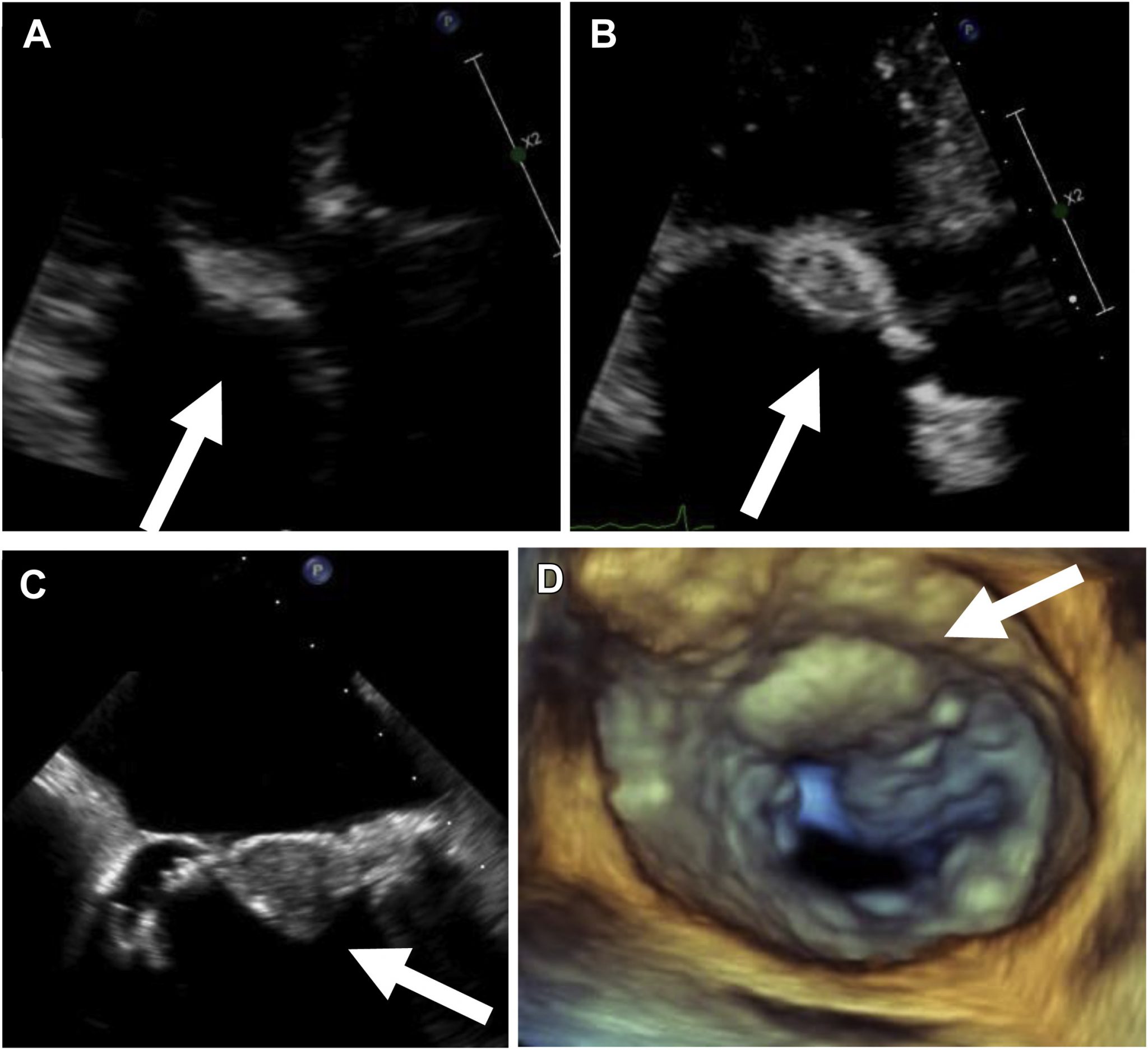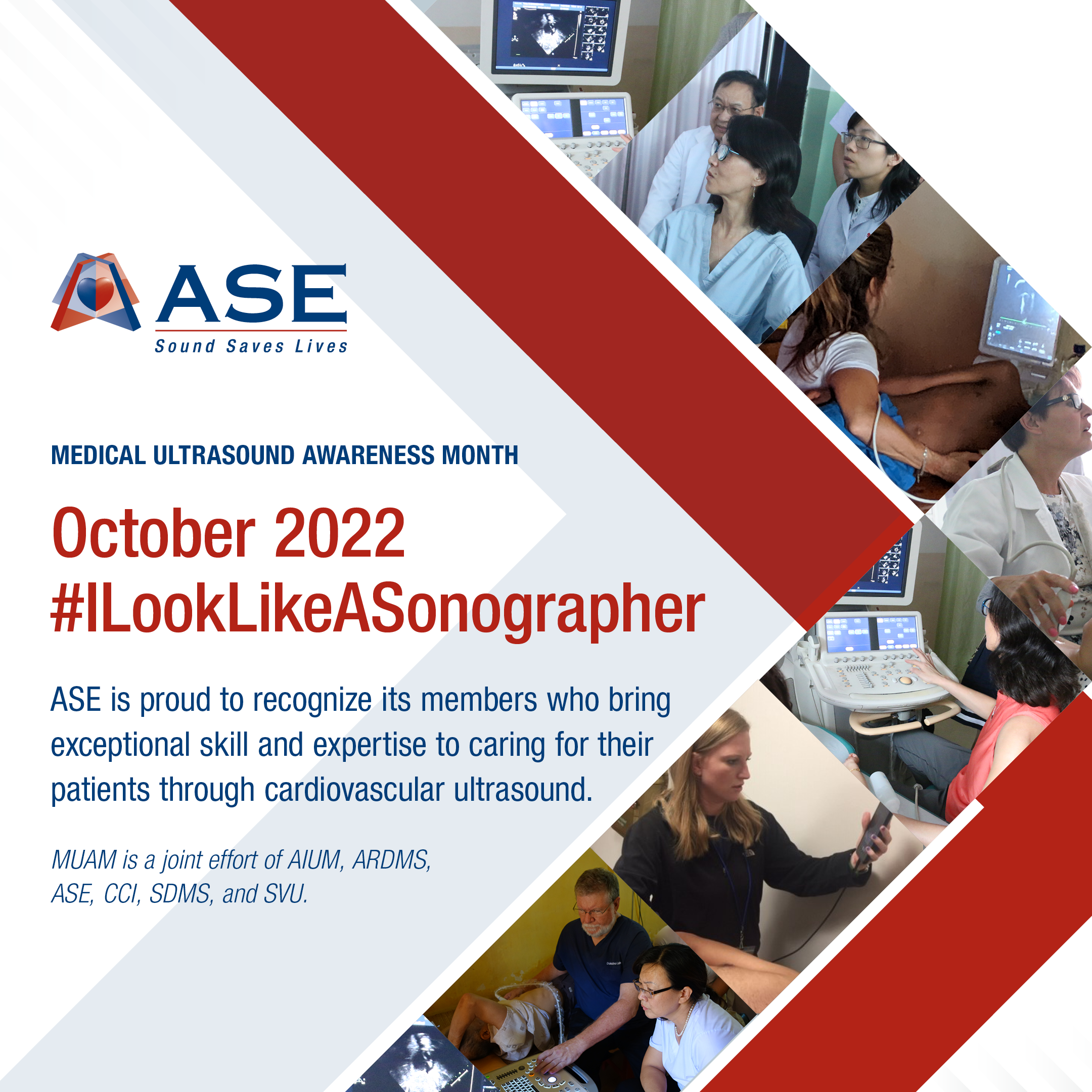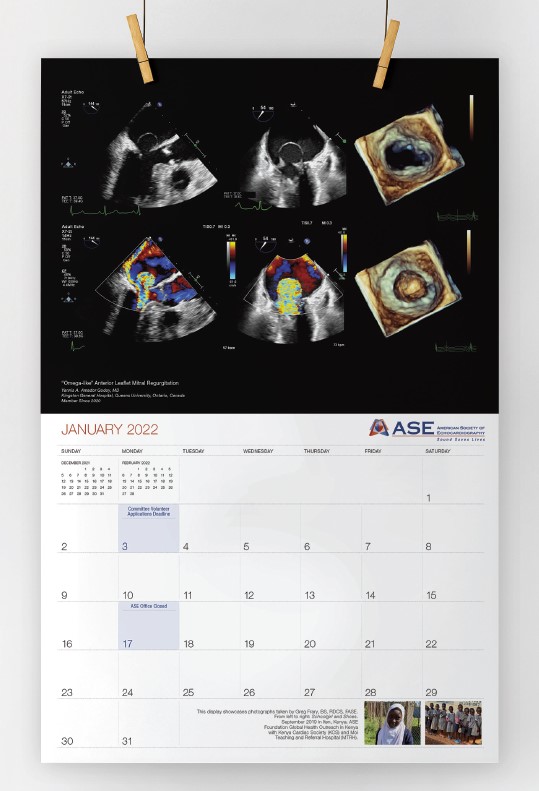Archives for October 2022
ECHO VOL 11 | Issue 10
ASE CAROL Act Support Letter
October 25, 2022
The Honorable Charles Schumer The Honorable Mitch McConnell
Majority Leader Republican Leader
U.S. Senate U.S. Senate
Dear Leaders Schumer and McConnell,
The American Society of Echocardiography (ASE) writes today in strong support of the Cardiovascular Advances in Research and Opportunities Legacy (CAROL) Act (H.R. 1193/S. 1133). This bipartisan legislation, which passed the House of Representatives unanimously last year, would help heart patients through expanded research, education, and investments into valvular heart disease. We thank you Leader McConnell for your co-sponsorship, and we urge the Senate to act before the 117th Congress adjourns to pass this important legislation.
Founded in 1975, ASE is the Society for Cardiovascular Ultrasound Professionals™️ and represents the largest global organization for cardiovascular ultrasound imaging. ASE is the leading advocate for physicians, sonographers, nurses, veterinarians, scientists, students, and all those with an interest in echocardiography, setting practice standards and guidelines for the field. The Society is committed to advancing cardiovascular ultrasound to improve lives.
According to the CDC, valvular heart disease affects 2.5% of the U.S. population. As many as 11 million Americans are living with heart valve disease and, each year, five million additional Americans are diagnosed with it. The CAROL Act would authorize significant investments into improving the health outcomes for those diagnosed with valvular heart disease by supporting education and awareness concerning the disease, and investing in research through the National Institutes of Health (NIH) to improve treatment. It also requires the Department of Health and Human Services (HHS) to develop best practices to treat valvular heart disease and encourages the agency to implement other projects to increase education and awareness of the disease.
Over 25,000 Americans die each year from valvular heart disease. The CAROL Act pledges the necessary investments in research and prevention to aid the millions of American lives affected by this disease. Please make heart valve research a priority by passing this legislation.
Sincerely,
Stephen Little, MD, FASE
President, American Society of Echocardiography
ASE Medicare Payment Cut Letter to Congress
October 24, 2022
House Speaker Nancy Pelosi Senate Majority Leader Chuck Schumer
U.S. House of Representatives U.S. Senate
1236 Longworth House Office Building 322 Hart Senate Office Building
Washington, D.C. 20515 Washington, D.C. 20510
House Minority Leader Kevin McCarthy Senate Minority Leader Mitch McConnell
U.S. House of Representatives U.S. Senate
2468 Rayburn House Office Building 317 Russell Senate Office Building
Washington, D.C. 20515 Washington, D.C. 20510
Dear Speaker Pelosi, Leader McCarthy, Leader Schumer, and Leader McConnell:
On behalf of the American Society of Echocardiography (ASE), I write to thank the Congress for the enactment of previous legislation that averted significant provider payment reductions in the 2022 Medicare Physician Fee Schedule (MPFS). These actions increased fiscal stability for clinicians and enabled Medicare beneficiaries to continue accessing medically necessary and appropriate care. I write now to urge the Congress to enact new legislation prior to year’s end that prevents implementation of scheduled 10 percent payment cuts to Medicare providers beginning 2023. If left unaddressed, these substantial payment reductions will have a profoundly adverse impact on Medicare beneficiary access to high-quality care delivery.
The ASE represents medical specialists dedicated to improving patient health and quality of life through the use of cardiovascular ultrasound. While physicians comprise the majority of ASE’s membership, the society also represents allied health professionals in the entire echo lab team. Reflecting our commitment to advancing high-quality patient care, the ASE has published over 65 evidence-based guidelines and standards that have become essential and integral to the medically appropriate practice and use of echocardiography.
The ASE is deeply concerned that the reductions contained in the 2023 Medicare Physician Fee Schedule proposed rule coupled with the expiration of previous Congressional interventions will result in a more than 10 percent Medicare payment cut to providers next year. Specifically, in 2023, clinicians are set to face a 4.42 percent cut to the MPFS conversion factor, a 4 percent PAYGO reduction, and the end of the 2 percent Medicare sequestration moratorium. Absent legislative action, these severe payment reductions will further jeopardize the financial stability and operations of providers caring for Medicare beneficiaries care who continue to experience significant instability from statutory payment cuts, lack of inflationary payment updates, and the ongoing impacts from the COVID-19 pandemic. Therefore, to prior to the end of 2022, ASE urges the Congress to:
- Eliminate the scheduled -4.42 percent conversion factor cut in the 2023 Medicare Physician Fee Schedule;
- Waive the 4 percent PAYGO cut;
- Provide relief from the Medicare sequester; and
- Eliminate the statutory annual payment freeze and provide an update to the MPFS in 2023 that reflects the high rate of inflation.
These legislative actions will provide the relief necessary to foster stability and prevent further strain on our health care system, thereby better enabling Medicare beneficiaries to continue accessing the medically appropriate care they need that improves patient health outcomes and quality of life.
Sincerely,
Stephen Little, MD, FASE
President, American Society of Echocardiography
Don’t Miss These Upcoming ASE Live Webinars!
Human Deep Hypothermic Cooling versus Animal Hibernation: Echocardiographic Insights
October 27, 2022 | 5:00 – 6:00 PM ET
The cardiovascular changes that occur during deep anesthesia in people may be mirrored in animals that hibernate: hypothermia, bradycardia, etc. In one context, these changes occur in a medical environment whereas in the other, they are a part of normal life. This session proposes that knowledge can be gained by pairing the perspectives of a human cardiothoracic anesthesiologist, Dr. Burkhard Mackensen, and a veterinary cardiologist with expertise in hibernating bears, Dr. Lynne Nelson. This is the first webinar offered by the ASE Veterinary Specialty Interest Group.
Moderator
- Etienne Côté DVM, DACVIM (Cardiology, SAIM), FACC, FCAHS
Speakers
- G. Burkhard Mackensen, MD, PhD, FASE
- O. Lynne Nelson, DVM, MS, DACVIM (Cardiology, SAIM)
Learning Objectives
- Better understand selected cardiovascular aspects of deep hypothermic anesthesia in humans, including echocardiographic aspects
- Better understand selected cardiovascular aspects of hibernation in large mammals, including echocardiographic aspects
- Gain additional insights into human cardiovascular physiology through understanding the changes that occur during hibernation, and into veterinary cardiovascular physiology through understanding the changes that occur during human deep hypothermic anesthesia
Earn 1 AMA PRA Category 1 Credit™ (CME/MOC) (pending approval).
This activity is FREE for ASE members and nonmembers. Remember to log in to the Member Portal.
Knowledge is Power: Considerations Before Signing an Employment Contract
November 07, 2022 | 7:00 – 8:00 PM ET
This webinar is a talk by employment attorney Renu Thamman on the key items to consider and negotiate before signing an agreement. With the increase in corporate medicine, doctors can no longer blindly sign these agreements that can have a serious impact on their future.
Moderator
- Ritu Thamman, MD, FASE, FACC
Speaker
- Renu Thamman
Learning Objectives
- Learn the key items to consider before signing an agreement
- Learn what things to negotiate before signing an agreement
No CME is offered for this webinar.
This activity is FREE for ASE members and nonmembers. Remember to log in to the Member Portal.
Assessment of Diastolic Function in Pediatric and Congenital Heart Disease
November 17, 2022 | 8:00 – 9:30 PM ET
This webinar will consist of two didactic lectures followed by debate on assessment of diastolic function in pediatric population. The webinar will highlight the need for accurate assessment of diastolic dysfunction in patients with congenital heart disease as well as children with acquired heart disease while acknowledging the lack of validation in children of parameters used in assessment of diastolic dysfunction in pediatrics.
Speakers
- Mihn Nguyen, MD, Assistant Professor, Texas Children’s Hospital, Baylor College of Medicine
- Keri Shafer, MD, Department of Cardiology, Boston Children’s Hospital & Assistant Professor of Pediatrics, Harvard Medical School
- Andreea Dragulescu, MD, Professor of Pediatrics, The Hospital for Sick Children, University of Toronto
- Piers Barker, MD, FASE, Professor of Pediatrics and Obstetrics and Gynecology, Duke University Medical Center
Learning Objectives
- Understand the measures routinely used to assess diastolic dysfunction.
- Understand the comprehensive assessment of diastolic dysfunction in adult congenital heart disease.
- Recognize the limitations to assessment of diastolic dysfunction in pediatric population.
Earn 1.5 AMA PRA Category 1 Credit™ (CME/MOC) (pending approval).
This activity is FREE for ASE members and nonmembers. Remember to log in to the Member Portal.
Available Now! echoCORE
ASE released its newest online educational tool echoCORE! The new echocardiography review and evaluation tool helps practitioners of echocardiography review a broad array of topics, key concepts, formulas, and the latest echo advancements in an interactive multiple-choice question and answer format. Special introductory pricing for a one-year subscription is $250 for ASE members and $300 for nonmembers.
Some key product highlights:
- Developed by 24 experts in the field.
- Over 38 topics covered.
- 150 questions
- Customized feedback with external resource links to ASE guidelines, full lectures on topics, JASE articles, and more.
- User receives a performance summary on each topic.
Learn more and purchase this product at ASEcho.org/echoCORE. Questions regarding the content? Contact Products@ASEcho.org.
Please note, this activity does not offer CME/MOC at this time.
SIGN UP: Free ASE Webinar on Oct. 27, 5-6 PM ET
Enroll in the first webinar offered by the ASE Veterinary Specialty Interest Group! This free webinar titled Human Deep Hypothermic Cooling versus Animal Hibernation: Echocardiographic Insights, will take place on October 27, 5:00 – 6:00 PM ET, and will explore the cardiovascular changes that occur during deep anesthesia in people and how these changes may be mirrored in animals that hibernate.
Attendees can earn 1 AMA PRA Category 1 Credits™ (pending approval). In addition to offering 1.0 CME credit, this activity has been developed and registered with ACCME to provide MOC, MOC Part 2, and MOCA 2.0 points in alignment with AMA PRA Category 1 Credit™.
The October CASE is Spookily Good!
The latest issue of CASE, ASE’s open access case reports journal, is available and packed with educational material to share with trainees and colleagues. CASE Editor-in-Chief Dr. Vince Sorrell commented, “It seems like every issue of CASE includes at least one report you need to keep handy as an image-reference in your echo reading room. This issue includes a CASE series demonstrating the normal and pathologic variations of caval and coronary sinus venous anomalies. This is an important report that includes outstanding 3D-CCT image correlations.”
 This issue also includes another Congenital Heart Disease article (authored by a sonographer), two cases highlighting the value of Multimodality Imaging, two Hemodynamic Corner cases, and two reports on Cardiac Tumors & Pseudotumors. Dr. Sorrell noted, “Most of us have seen patients with severe mitral annular calcification with or without associated echo-free spaces commonly referred to as liquefaction or caseous necrosis. Some of us have also seen the rare pathologic transformation to fistula formation. Fujiwara and coauthors provide us with an excellent surgically correlated case series of these patients with an absolutely striking video taken in the OR that you simply must see to believe!” Dr. Sorrell’s editorial, “Interpreting the Interpretation,” challenges clinical echocardiographers to continually improve their communication of echo findings to non-specialist colleagues to help improve outcomes.
This issue also includes another Congenital Heart Disease article (authored by a sonographer), two cases highlighting the value of Multimodality Imaging, two Hemodynamic Corner cases, and two reports on Cardiac Tumors & Pseudotumors. Dr. Sorrell noted, “Most of us have seen patients with severe mitral annular calcification with or without associated echo-free spaces commonly referred to as liquefaction or caseous necrosis. Some of us have also seen the rare pathologic transformation to fistula formation. Fujiwara and coauthors provide us with an excellent surgically correlated case series of these patients with an absolutely striking video taken in the OR that you simply must see to believe!” Dr. Sorrell’s editorial, “Interpreting the Interpretation,” challenges clinical echocardiographers to continually improve their communication of echo findings to non-specialist colleagues to help improve outcomes.
REMINDER: There are still fee waivers available for sonographer lead authors, sponsored by the Sonography Council, waiting to be claimed by you. Submit your case today! Email Debbie Meyer, Director of Publications (JASE, CASE), or Andie Piddington, Deputy Managing Editor (JASE, CASE), with any questions or to request a case-writing mentorship from an ASE sonographer.
ASE Foundation WASE Study Results Highlighted in News Release by Ultromics
ASE is pleased to share the following news release, provided by Ultromics, highlighting the recently published research initiatives funded through the ASE Foundation, with support from the University of Chicago and MedStar Health, and in-kind support from Ultromics.
Ultromics’ AI technology analyzes echocardiogram images and predicts cardiac-related mortality better than human analysis.
OXFORD, England, 10th October, 2022
A new study from the World Alliance Societies of Echocardiography (WASE), a major international research initiative led by the American Society of Echocardiography (ASE), says artificial intelligence (AI) is superior to human experts when it comes to predicting cardiac-related death1, a capability that could revolutionize cardiovascular care.
 The AI platform, EchoGo by Ultromics, is FDA-cleared, CE Marked and in-use by a growing number of provider organizations across the US and UK. Ultromics is moving quickly and innovatively to help develop novel approaches to improve heart failure detection. The company recently announced a partnership with The Foundation for the National Institutes of Health (FNIH)2 that will use their upcoming FDA breakthrough designated product to improve heart failure detection3, looking specifically at heart failure with preserved ejection (HFpEF).
The AI platform, EchoGo by Ultromics, is FDA-cleared, CE Marked and in-use by a growing number of provider organizations across the US and UK. Ultromics is moving quickly and innovatively to help develop novel approaches to improve heart failure detection. The company recently announced a partnership with The Foundation for the National Institutes of Health (FNIH)2 that will use their upcoming FDA breakthrough designated product to improve heart failure detection3, looking specifically at heart failure with preserved ejection (HFpEF).
This latest research from WASE builds on previous work which showed that AI–based analysis could accurately detect outcomes from echocardiographic images1, including combining myocardial strain biomarkers to improve predictive accuracy, recommended as clinical best practice4. With this, an interest in the AI’s ability to make outcome predictions was compared with conventional analysis by human experts.
Dr. Federico M. Asch, lead study author and Director of the Cardiovascular and Echo Core Labs at MedStar Health Research Institute, said: “AI derived results outperformed traditional manual analysis in the generation of Left Ventricular Ejection Fraction and Global Longitudinal Strain, as the AI proved to be a significant predictor of outcomes, which traditional reads by expert echocardiographers could not achieve.”
The study looked at 870 patients admitted to 13 hospitals in 9 countries (Asia, Europe, United States, Latin America), who had acute COVID-19 and underwent transthoracic echocardiography.
The research was supported in partnership by MedStar Health, University of Chicago, and Ultromics. Dr. Federico Asch, Director of the Cardiovascular and Echo Core Labs at MedStar Health Research Institute, and Dr. Roberto Lang, Director of the University of Chicago’s Non-invasive Cardiac Imaging Laboratory, served as principal investigators.
Echocardiographic left ventricular ejection fraction (LVEF) and left ventricular longitudinal strain (LVLS) were obtained manually by multiple expert readers and by the automated EchoGo AI platform from Ultromics. The ability of the manual and AI analyses to predict all-cause mortality was compared.
AI-derived LVEF and LVLS were predictors of mortality in univariable and multivariable regression analysis (odds ratio, 0.974 [95% CI, 0.956-0.991; P = .003] for LVEF; odds ratio, 1.060 [95% CI, 1.019-1.105; P = .004] for LVLS), but LVEF and LVLS obtained by manual analysis were not1.
Direct comparison of the predictive value of AI versus manual measurements of LVEF and LVLS showed that AI was significantly better (P = .005 and P = .003, respectively)1. In addition, AI-derived LVEF and LVLS had more significant and stronger correlations to other objective biomarkers of acute disease than manual reads. Lastly, , inter-operator agreement for LVEF and GLS was 23% and 44% (respectively) lower for manual measurements than that achieved by the AI1.
Dr Ross Upton, CEO and Founder of Ultromics, said “Developing precision strategies for cardiovascular disease is more critical than ever, particularly heart failure, where patient cases and costs are expected to double between now and 20305. We built our AI platform to improve the accuracy of heart failure detection and prevent worsening cardiac outcomes.” Upton continued: “The technology was built using deep learning, from 10 years’ worth of echocardiographic images tied to outcomes, to provide precision analysis independent of expert clinicians”.
This study demonstrates the prognostic value of AI for routine primary care and improved accuracy for prediction of cardiovascular disease. Ultromics will continue to explore how AI can contribute to the development of echocardiography and preventative care.
Dr. Asch will join Gary Woodward, pHD, Ultromics Chief Technology Officer, on a webinar on November 3rd, 2022 to discuss these ground-breaking results. Visit www.ultromics.com to register for the online seminar.
About Ultromics:
Ultromics is the leader in artificial intelligence for echocardiography enabling earlier detection and risk stratification of heart failure for better outcomes, lower costs, and improved patient care. All providers, regardless of their care setting, can now make precise, accurate, and timely diagnoses of heart failure with Ultromics’ AI technology. The cloud-based platform, EchoGo, offers a simple, secure and seamless way to augment your existing technology and workflow with fully automated, advanced echo analysis including critical advanced measures recommended by guidelines.. The technology is FDA-cleared and trusted by world-renowned organizations such as Mayo Clinic and the NHS England. Learn more: https://www.ultromics.com
For media inquiries:
Ultromics VP of Marketing – Jeff.Zinger@ultromics.com
-
Asch J, et al, J Am Soc Echocardiogr. 2022;35:1-55
-
https://www.ultromics.com/press-releases/ultromics-joins-fnih-partnership-to-transform-heart-failure-detection
-
EchoGo Heart Failure is pending FDA 510k clearance
-
https://www.onlinejase.com/article/S0894-7317(21)00483-1/fulltext
-
Smiseth, OA, et al. European Heart Journal. 2015;37:1196–1207
-
https://www.ncbi.nlm.nih.gov/pmc/articles/PMC5494150/
Medical Ultrasound Awareness Month!
 October is Medical Ultrasound Awareness Month (MUAM)!
October is Medical Ultrasound Awareness Month (MUAM)!
During MUAM and in the coming months, ASE will share #ILookLikeASonographer social media posts to celebrate our sonographer members and increase awareness about this important and rewarding profession.
Additionally, and ASEF will shine a spotlight on ultrasound professionals all month long. Submit a photo of a sonographer you with with along with an appreciation message to Mary Carmody. Submissions will be shared on ASEF’s website.
Winners of the 2023 Image Calendar Competition
Thank you to everyone who uploaded echo images and voted on Connect@ASE during the Image Calendar Competition. Please join ASE in congratulating the following members, whose images have been selected for the 2023 ASE Image Calendar:
- Melynda Ancell, RDCS (AE, PE)
- Bonita Anderson, DMU, (Cardiac), MAppSc (MedU/S), ACS, FASE
- Clara Angulo, ACS, MBA, FASE
- Gerald Jason Ballo, RN, RDCS, RCS, BSE
- Luciano Belem, MD
- Kana Fujikura, MD, PhD, FASE
- John Goodman, RDCS, RVT
- Jason Pereira, MS, RCS, FASE
- Marie Sadler, RDCS
- Madeline Schiminger, MPH, RDCS (AE, PE), FASE
- Nicole Simpkins, BS, RDCS (AE, PE), RCCS, FASE
- Angelica Valentin, RCS
- Megan Yamat, ACS, FASE
- Kathryn Ziegler, BS, RDCS, FASE
To receive your copy of the 2023 Image Calendar, renew your ASE membership by December 31, 2022!





